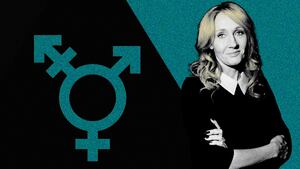For weeks, The Witch Trials of J.K. Rowling has unspooled J.K. Rowling’s perspective on gender. Beyond the Harry Potter author herself, host Megan Phelps-Roper has largely interviewed sources whose views seem to support or align with Rowling’s. Episode 6, however, finally hands the mic over to a pair of sources who expressed disappointment with Rowling’s comments.
One of those sources, who popped up briefly during a previous episode, is the YouTuber Natalie Wynn, aka ContraPoints—who disavowed the podcast before its debut in February. The other was a 17-year-old named Noah, whose father apparently contacted Phelps-Roper directly and suggested that she speak with his son about his transition.
In February, before The Witch Trials of J.K. Rowling premiered from Bari Weiss’ new media company The Free Press, Wynn tweeted that her participation in the podcast was “a serious lapse in judgment.” She said her conversation with Phelps-Roper included “a pretty miserable three-hour interrogation about my own transition, as well as the usual ‘concerns’ about trans rights.” (The latter can be heard as part of their conversation during this week’s episode, ”Natalie and Noah,” the penultimate installment.)
During her appearance in this week’s episode, Wynn discussed her viral YouTube videos about cancel culture and Rowling. During her conversation with Phelps-Roper, she distinguished between two types of bigotry—direct and indirect. Direct prejudice, she said, involves “framing the target as vermin, invaders, parasites—this dangerous, foreign, infiltrating menace.” The indirect variety, meanwhile, is often expressed (as she put it in her Rowling video) as “concern or debate about a host of proxy issues… Frequently the claim is that a once needed liberation movement has now gone too far.”
Phelps-Roper asked Wynn about various concerns Rowling has expressed about trans people, including the debunked suggestion that trans people pose a threat to women in public restrooms. (As Vox noted in 2016, such suggestions about bathroom safety have been used to prop up racial segregation and anti-gay sentiments in the past.) In the end, however, Wynn told her host, “I’m less concerned with the questions than I am with the consequences.”
Considering her immense platform, Wynn said, Rowling is accountable for the way she chooses to engage in public conversations. As “someone with a huge platform who wants to pose these questions,” Wynn said that Rowling has to “be responsible for the way that you go about doing that,” adding, “If you do it in a way that’s harmful to trans people—as I consider beyond any question that the way J.K. Rowling has done it has been harmful—then I think it’s valid for people to be upset with you and criticize that.”
Given how Rowling has chosen to broach the subject, Wynn said, she does not trust that the author is “engaging in good faith.”
“I’ve never really gotten the impression that she wants to know more about the experiences of trans people from the way that these questions are posed,” Wynn said. “It’s all about, ‘Isn’t this dangerous to all of the rest of us? Aren’t these people posing a threat to us? Isn’t this dangerous to children?’ I see that as a very loaded question.”
The second source in this week’s episode, the 17-year-old Noah, discussed his transition as a teenager, his parents’ reaction to his coming out as trans, and the gender-affirming care he has received. Phelps-Roper also asked him, as she’d asked Wynn, about some of Rowling’s “concerns,” as well as what he would say to Rowling if he could address her directly. Like Wynn, Noah observed that the way Rowling has expressed her beliefs seems to obscure their broader implications.
“Maybe this is a childlike thing for me to say—that if I sat down with J.K. Rowling, we would have a great time talking and we would get along and she would say things that I would cherish for the rest of my life,” Noah said. At the same time, he observed that while “a lot of what she has said is not bigotry in the way that bigotry is portrayed sometimes,” the way she has chosen to express her views has caused harm.
“To my knowledge, I strongly believe she has not said anything like, ‘I’m better than trans people; trans people are this negative thing,’” Noah said. “… But I think that there was bigotry veiled in what she was saying, or that things she was saying were reminiscent of bigoted ideas, and she expressed what are very reasonable emotions to a platform where they became interpreted as fact, or used to support opinions that are bigoted or untrue or harmful.”
At this point, six episodes into the podcast and with only one remaining, it’s fair to wonder why it took so long for these perspectives to get their due. Their deployment this far into the podcast supports the notion that its title seems to invite—that this project has already decided whom it believes has really been persecuted. Phelps-Roper says that the final episode, out next week, will give Rowling “the chance to answer some of the hard questions posed by her critics,” but isn’t that what the rest of the series was designed to do?
And given what we’ve heard so far, it’s hard to believe that we’ll ever get an enlightening answer to what Phelps-Roper frames as her central question for her subject: “What if you’re wrong?”






